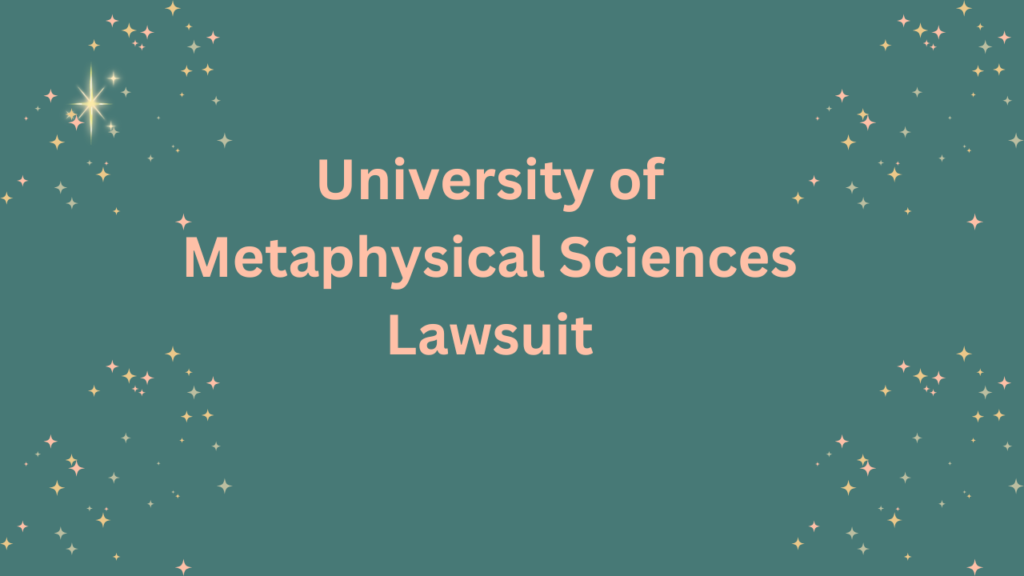
The University of Metaphysical Sciences has become a focal point for controversy, especially regarding its legitimacy and the programs it offers. Allegations surrounding its degrees, its business practices, and the University of Metaphysical Sciences lawsuit have sparked debate. This article explores the legal issues, accusations of fake degrees, and the overall impact of these controversies on its reputation.
Understanding the University of Metaphysical Sciences
Located in Sedona, Arizona, the University of Metaphysical Sciences offers courses in metaphysical sciences, spiritual counseling, and holistic healing. While these programs may appeal to individuals seeking alternative spiritual education, the university is not accredited by any traditional educational authority, raising questions about the value of its degrees.
Accreditation Concerns and Their Implications
The most significant concern regarding the University of Metaphysical Sciences is its lack of accreditation. Accreditation ensures that a university meets specific academic standards and that its degrees are recognized by employers and other educational institutions. Because UMS is not accredited, its degrees are often seen as less valuable, especially for those looking to enter conventional job markets.
The University of Metaphysical Sciences Lawsuit: Allegations of Fake Degrees
Over the years, the University of Metaphysical Sciences lawsuit has become a focal point of online discussions. Critics argue that the university offers degrees that hold little to no real-world value, making it a target for legal action. Some former students have alleged that they were misled about the legitimacy of their degrees, claiming that the University of Metaphysical Sciences lawsuit should be taken seriously as it highlights the deceptive nature of the institution’s business practices.
Online Discussions and Negative Reviews
On platforms like Reddit, Quora, and the Better Business Bureau (BBB), many individuals have shared their experiences with the University of Metaphysical Sciences lawsuit and its impact on students. These reviews often mention dissatisfaction with the quality of the education, the lack of support, and the perceived fraudulent nature of the degrees offered.
Common Complaints About the University of Metaphysical Sciences:
- Misleading Degree Programs: Many former students claim that the degrees are not recognized outside of the metaphysical or spiritual communities.
- Unclear Business Practices: Allegations of deceptive advertising and unclear course outcomes have led to growing concerns about the integrity of the university.
- The University of Metaphysical Sciences Lawsuit: Legal action taken by students has exposed how the university’s marketing practices might mislead prospective students.
BBB and Online Review Platforms
The BBB website hosts numerous complaints about the University of Metaphysical Sciences lawsuit, with many reviews reflecting concerns about the institution’s legitimacy. These complaints often detail issues related to the school’s failure to disclose critical information, such as the lack of accreditation, and the lack of transparency regarding the value of their degrees in the job market.
The University of Metaphysical Sciences Lawsuit: Legal Action Against Deceptive Practices
In recent years, the University of Metaphysical Sciences lawsuit has been discussed in legal circles, particularly in relation to its marketing tactics. The lawsuit centers on the allegations that the university misrepresented the value of its degrees and failed to provide clear information about the lack of accreditation. Legal experts argue that the University of Metaphysical Sciences lawsuit highlights a significant issue in the growing market for alternative education, where some institutions may prey on students looking for non-traditional degrees.
The 2020-2021 Lawsuit and Legal Fallout
The University of Metaphysical Sciences lawsuit gained attention in 2020-2021 when former students filed legal complaints against the institution. The lawsuit alleged that UMS had misled students into thinking their degrees would be widely recognized, only to discover that they were essentially worthless in traditional job markets. The legal action further fueled negative publicity, with many students sharing their experiences online, claiming that the University of Metaphysical Sciences lawsuit was indicative of a larger issue in the education sector.
Is the University of Metaphysical Sciences Degree Worth It?
While the University of Metaphysical Sciences lawsuit has certainly tarnished the reputation of the institution, it’s important to consider whether pursuing a degree here is worth it, depending on your personal or professional goals. If you’re seeking a degree for personal or spiritual growth, the programs may provide valuable insights. However, for individuals seeking a degree that holds weight in a professional setting, the lack of accreditation and the ongoing University of Metaphysical Sciences lawsuit should give you pause.
Pros and Cons of UMS Degrees
Pros:
- Spiritual Growth: For those interested in metaphysical or spiritual practices, UMS can offer a unique and fulfilling educational experience.
- Flexibility: UMS provides online courses that allow students to learn at their own pace, making it an accessible option for people worldwide.
Cons:
- No Formal Recognition: The lack of accreditation makes it difficult to use a UMS degree in a professional context.
- The University of Metaphysical Sciences Lawsuit: Ongoing legal battles and negative reviews raise questions about the university’s business practices and transparency.
Conclusion: Should You Consider the University of Metaphysical Sciences?
Before enrolling in any program at the University of Metaphysical Sciences, it’s crucial to thoroughly research both the institution and the legal issues it faces. While the university may provide a unique education in metaphysical sciences, its lack of accreditation, coupled with the growing concerns raised by the University of Metaphysical Sciences lawsuit, should be carefully considered. If your goal is to gain a degree for professional advancement, you may want to look elsewhere for a more recognized qualification.
For those seeking personal or spiritual growth, however, the courses offered may still hold value, even in light of the University of Metaphysical Sciences lawsuit. Always ensure you are making an informed decision based on your goals and expectations.


